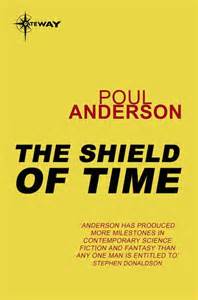In time travel fiction, it is necessary to use temporal adverbs with care. In The Shield Of Time (New York, 1991), the Exaltationist time criminals discuss the Time Patrolman, "Holbrook" (really Everard), who is on the run from the Bactrian authorities covertly controlled by them:
"'When he doesn't report in -'
"'I doubt the Patrol expects to hear from him at once.'" (p. 85)
What does "at once" mean? If Everard's colleagues are in the twentieth century from which he came, then they can receive his report immediately after his departure to 209 BC and can immediately take action if no such report arrives.
"'...we must track him down and dispose of him before he somehow gets in touch with others,...'" (p. 87)
This makes sense. The less time he is on the run, the less opportunity he has to contact any colleagues.
"'...or before the Patrol takes alarm and comes looking for him.'" (ibid.)
Again, if the Patrol is going to take alarm at a later date, then they can already be looking for Holbrook/Everard even before the Exaltationists have had this conversation. Was even a writer as careful as Poul Anderson able to keep track of the implications of his own time travel premise?

No comments:
Post a Comment